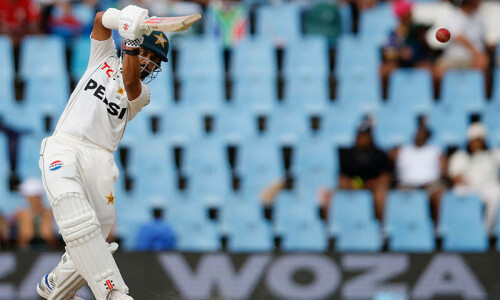 BEIJING, Aug 22: Usain Bolt completed a world-record breaking golden treble at the Beijing Olympics on Friday, as Ethiopian Tirunesh Dibaba claimed a landmark long-distance running double.
BEIJING, Aug 22: Usain Bolt completed a world-record breaking golden treble at the Beijing Olympics on Friday, as Ethiopian Tirunesh Dibaba claimed a landmark long-distance running double.
Bolt, who set world records of 9.69 and 19.30 seconds to win the men’s 100 metres and 200 metres, ran the third leg of the Jamaican 4x100 metres relay squad that won a maiden gold in the event in 37.10 seconds, breaking the United States’ 15-year-old record.
Nesta Carter, Michael Frater, Bolt and anchor leg Asafa Powell coasted to victory ahead of Trinidad and Tobago, aided by the absence of a US team that on Thursday failed to advance to the final after dropping the baton in qualifying.
“It’s a great feeling. I was really excited to go out there and give Usain his third world record,” said Powell.
In other medal events, long jumper Maurren Maggi landed Brazil its first ever Olympic track and field medal, American Bryan Clay won the decathlon and Australian Steve Hooker claimed the men’s pole vault crown.
Dibaba, 23, who last week won the 10,000 metres crown, produced a scintillating final lap of 59.54 seconds to win the women’s 5,000 metres gold 15 minutes 41.40 seconds at the packed 91,000-capacity National Stadium.
Turkey’s Ethiopian-born Elvan Abeylegesse claimed silver in 15:42.74, with defending champion and current world champion Meseret Defar finishing with bronze at 15:44.12.
Dibaba’s double is a landmark for women runners and the first since male compatriot Miruts Yifter’s feat over the same events at the 1980 Moscow Games.
“I am very happy,” said Dibaba. “I will remember the Beijing Games forever because I won two gold medals here.”
In the 10-discipline event of the decathlon, Clay finished with 8791 points to add to the silver he won in Athens in 2004, a massive 240 points ahead of Belarussian Andrey Krauchanka, with Cuba’s Leonel Suarez third on 8527.
Injury-hampered reigning world and 2004 Olympic champion Roman Sebrle of the Czech Republic finished sixth on 8,241 points, weeping and pounding his fist on the track after the concluding 1,500 metres race.
In the field, the 32-year-old Maggi, who served a two year drugs ban in 2003, won the long jump with a best first effort of 7.04 metres, one centimetre further than defending champion Tatiana Lebedeva of Russia.
Nigerian Blessing Okagbare — who was only competing because Ukrainian finalist Lyudmila Blonska was thrown out for doping — was third with a best of 6.91 metres.
Earlier Sweden’s 2004 heptathlon Olympic champion Carolina Kluft failed to make the cut for the final three jumps, jumping a best of 6.49 metres for ninth place.
The men’s pole vault saw Australian Hooker win gold with an Olympic record of 5.96 metres ahead of Russian Evgeny Lukyanenko (5.85 metres) and Ukraine’s Denys Yurchenko (5.70 metres).
Back on the track, Russia won the women’s 4x100 metres relay title as favourites Jamaica failed to finish after botching the handoff between the third and fourth legs.
The Russians, who settled for Olympic silver in 2004, broke through with Evgeniya Polyakova, Aleksandra Fedoriva, Yulia Gushchina and anchor Yuliya Chermoshanskaya winning in 42.31 seconds.
Belgium, third at last year’s worlds, were second in 42.54 seconds with Nigeria claiming bronze in 43.04 seconds.
Alex Schwazer of Italy won the men’s 50 kilometres race walk to deny Russia a clean sweep of the Olympic walk titles.
The 23-year-old two time world medallist broke the 20-year-old Olympic record as he timed 3:37.9 to take gold ahead of 20km bronze medallist Jared Tallent of Australia.
Russia’s silver medallist from 2004, Denis Nizhegorodov, won the bronze in 3hr 40.14.
US one-lap experts ensured there was no repeat of the disastrous baton-dropping antics in the 4x100 metres relay, the men and women’s teams both qualifying with ease for the 4x400 metres finals on Saturday.
The anticipated dominance of long distance track running by the Ethiopians should be continued by 10,000 metres gold medallist Kenenisa Bekele who is aiming for the double in the men’s events. The 5,000 metres is on Saturday, the last full day of competition.
Meanwhile, China have barely featured in the track events, where they have hoped to score some success to match their medal dominance in sports like table tennis and diving.
Big hope, 110m hurdler Liu Xiang, pulled out of his heat with injury, devastating legions of Chinese fans who had prayed for a repeat of his 2004 win, the country’s first track gold.
Concerns have resurfaced over how far China have been prepared to go to deliver a Games of which the Chinese can be proud.
The International Olympic Committee has ordered an investigation into allegations Chinese authorities falsified the age of a double gold medal winning gymnast because she was too young to compete.
China’s He Kexin, who won team gold in artistic gymnastics and an individual title on the asymmetric bars, was registered as being born on Jan. 1, 1992, meeting the rule that gymnasts must at least turn 16 in the year of the Olympics.
There have been persistent media allegations He competed in earlier tournaments under a later birth date. On Thursday an American computer expert said he had uncovered Chinese state documents that proved she was 14 and not 16.
The caption on a photograph published by Chinese state news agency Xinhua last year referred to “13-year-old He Kexin”, while China Daily reported in May that she was 14.
An IOC official said the gymnastics federation would look into “discrepancies” over He’s age but Games organisers were at pains to stress she had already been cleared to compete.
“Everything that has been received so far shows we have no problem of eligibility for these competitors,” said the IOC’s sports director Christophe Dubi.—Agencies













































Dear visitor, the comments section is undergoing an overhaul and will return soon.